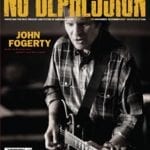Hello Stranger from Issue #72
A dozen paces behind me, in a double closet filled with camping gear, winter coats, a box of stray patch cords and, perhaps, the family of mice our declawed cats chase in the midnight hours, there lurks a cheap acoustic guitar, left behind by another man long ago now.
I do not play. Twice a week for six years after class I went to piano lessons, and by the end of grade school it was clear I had no talent and less rhythm, that I would not even follow my mother’s lead and play string bass in the back of the orchestra. Deliverance emboldened me to try the family banjo, with even less luck.
I do not play.
And yet if I walk into a room with an unguarded guitar, even though I may well be in the presence of an actual working musician, it is an effort of will power — still — not to pick up the instrument and try. To pluck at it as Sherlock Holmes scraped his violin, and not even half as well.
Every once in a while, when my wife isn’t around to listen and I imagine that our daughter will be entertained, I pull that poor guitar out and torture it for a few minutes. And then put it back, because our daughter is not to be entertained by such foolish self-indulgence.
And because I do not play.
Each issue of this magazine has its own internal logic, revealed to its theoretical makers only when all the pieces lay upon our metaphorical and real desktops. (If only the real desktop had a search function…)
For awhile Peter and I toyed with calling this our classic rock issue, what with strong albums from Levon Helm and John Fogerty and Robert Plant (with Alison Krauss). I contemplated reaching out to an old acquaintance, one of the last psychedelic poster artists left on the west coast, to illustrate a cover. Mostly he makes furniture these days, or so I hear, but he can sometimes be coaxed out of retirement, between commissions.
Then, of course, Plant became even less available in the furor following the announcement of a Led Zeppelin reunion, and we came to our senses. More or less.
All of which marks us, according to the newest school of music criticism, as dated and “rockist.” Which they mean in a new and pejorative sense. My guess is that this school of criticism has evolved from the need to create an aesthetic justification for those raised to believe the Backstreet Boys were good and that “American Idol” is necessary. And because the landscape has changed, because youth must be served.
It also reflects, I suspect, the evolution of American popular music far, far away from its long-established roots in blues. There was once a canon that a young music writer could be expected to become acquainted with, which began with (simplifying for speed, if not accuracy) the Beatles and Bob Dylan, then reached back to Robert Johnson and Mississippi John Hurt and Muddy Waters, and forward through the guitar heroes of the 1960s and ’70s.
Punk and metal both divorced rock from its blues roots, and hip-hop…I’d guess (and it’s only a guess) that most hip-hop doesn’t know it comes from a blues tradition. Toss in electronica and world music and everything else that has happened since I got old (hah!), mix in the segregation of our present radio formats, and we are in danger of losing the common language of our culture.
The guitar.
And it is the guitar which runs through this issue, in many of its myriad voices. Once upon a time Chuck Berry could walk onstage with a local pickup band and expect them to be conversant in his music. If you meant to play rock ‘n’ roll, you had to be able to play Chuck Berry and Bo Diddley and Elmore James and Jimmy Page, Jeff Beck, Eric Clapton, Keith Richards…all those guys. You had to know the language.
As your own style evolved (that is, I’m guessing this is like writing, because I cannot play), you learned not to ape the masters, but to quote them judiciously. It was, once, part of our shared language as listeners. Part of the coming up as a young player.
(I am trying to imagine what the guys in Mudhoney would do if Chuck Berry came onstage.)
Reading through this issue, from Jesse Fox Mayshark’s interview with Wilco guitarist Nels Cline, through the several sightings of Larry Campbell (with Marie Knight, with Levon Helm, with Abbey Lincoln), through the archetypal riffs of cover subject John Fogerty, back into Rich Kienzle’s well-reasoned reappraisal of Berry’s Chess years and, yes, through to Robert Plant and Alison Krauss…the guitar is at the center of things.
Comfort food, I reckon.
And I still wish I could play the darn thing.




